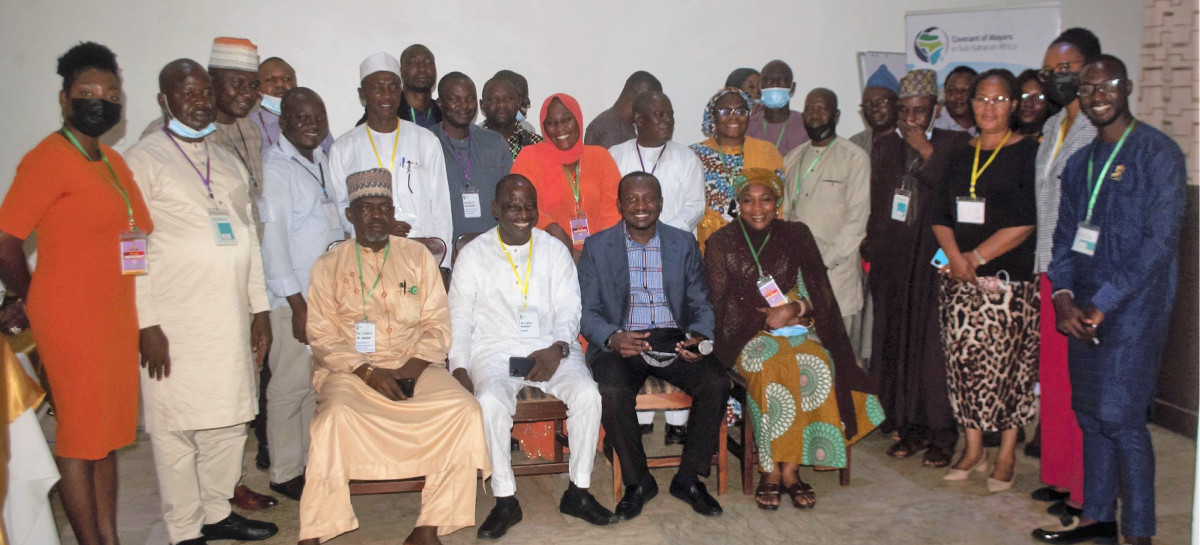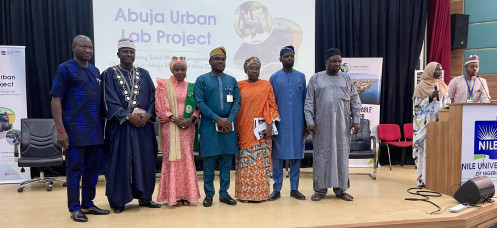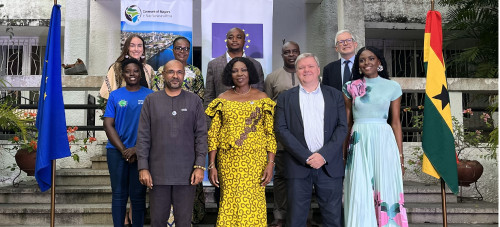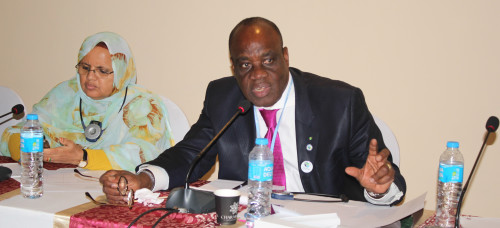Making Abuja a better city by identifying the impact of climate change on its population
Published: 29 Nov 2021

Less than ten months after joining the Covenant of Mayors in Sub-Saharan Africa (CoM SSA), the Abuja Municipal Area Council (AMAC) in Nigeria achieved another milestone by identifying the climate hazards with the biggest impact on the city and its people during an interactive workshop.
To translate their political commitment into practical measures, CoM SSA signatory cities commit to developing and implementing a Sustainable Energy Access and Climate Action Plan (SEACAP). This key document helps the city identify targets and actions that will best mitigate carbon emissions, adapt to the impacts of climate change and provide sustainable energy access to citizens, in alignment with the Nationally Determined Contributions (NDCs).
In line with this, the Risk and Vulnerability Assessment (RVA) workshop on 12 October 2021 was part of a series of data verification workshops that started in April to ensure that the peer-reviewed literature available about Abuja’s climate hazards accurately reflects the city’s situation and can feed into the baseline section of the SEACAP.
In his opening remarks, Arc. Andrew Gaza, one of the CoM SSA focal points in the Abuja Municipal Area Council (AMAC) said the workshop was part of the city’s broader objective to “take urgent and ambitious action to adapt to the impacts of climate change while contributing to the global goal of keeping global warming below 1.5 degrees centigrade”.
The workshop’s main objectives, with city officials and various relevant stakeholders attending, were to:
· Identify the impacts of climate hazards on different economic sectors and population groups;
· identify the magnitude of expected future impacts of climate hazards on these different sectors and population groups; and
· identify factors that challenge or support climate change adaptation action.
The RVA is significant because it enables local jurisdictions to identify their exposure to current and future climate hazards, vulnerabilities, risks and potential climate change impacts, as well as understand the main specificities that contribute to the exacerbated consequences of a specific climate hazard. Based on the available data, an assessment is undertaken as a result, followed by regular monitoring and an evaluation against a baseline context.
During the workshop, staff from the Deutsche Gesellschaft für Internationale Zusammenarbeit (GIZ) together with its counterpart ICLEI Africa, facilitated several group-focused activities with the participation of AMAC officials and other stakeholders to identify and verify climate hazards existent in Abuja and the sectors and population groups most vulnerable to them.

The findings of the Risk and Vulnerability Assessment will be used to consolidate key information
about the various climate hazards already affecting the Abuja Municipal Area Council.
Some of the hazards identified include rainstorms, severe wind, thunderstorms, fires, water-borne diseases, vector-borne diseases, airborne diseases and insect infestation. As per the key sectors most vulnerable to climate change in AMAC, these include: energy, environment, biodiversity and forestry; water supply and sanitation; waste management; food and agriculture; public health; commerce and industry; transport, society and culture; and education.
In turn, the population groups more vulnerable to climate change in AMAC were identified as children, elderly people, people with disabilities, pregnant women, low-income households, indigenous people, illiterate people, widows and orphans, and internally displaced persons (IDPs).
The participants to the RVA workshop stressed the importance of these interactive activities and the creation of spaces for engagement with members of other departments. “I enjoyed the interaction between my colleagues from other departments which created debates on issues within the agencies,” one participant shared.
After the activities were completed, Arc. Andrew Gaza reiterated in his final remarks that “we are working towards one goal – to see how we can make Abuja a better city.”
Mrs Abiodun Essiet, another CoM SSA focal point, highlighted in her closing remarks the next steps after the completion of the RVA. These include setting targets (based on the outcomes of the RVA) to reduce and adapt to the impacts of climate change and then identifying actions to meet the targets. This will be done in early 2022 through participatory workshops and further bilateral meetings with relevant stakeholders of the CoM SSA initiative, co-funded by the European Union and the German Federal Ministry for Economic Cooperation and Development (BMZ) for the period 2019-2022.





